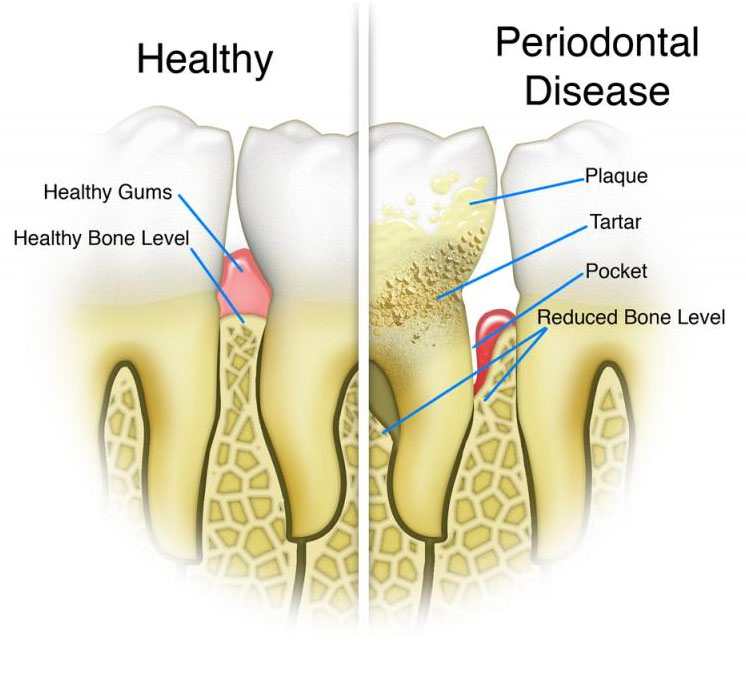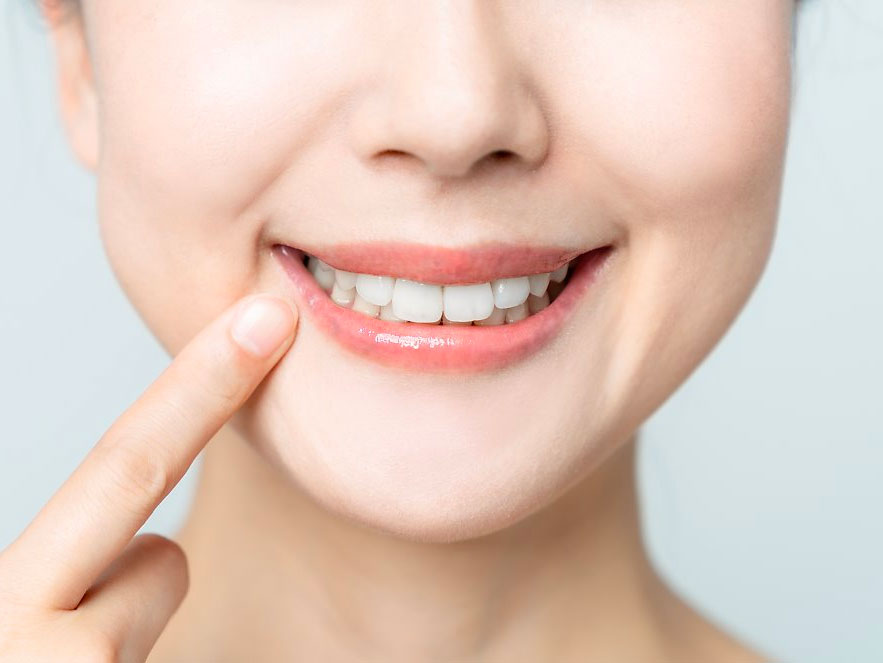We look forward to welcoming you back!
The main cause of gum disease is bacterial plaque, a sticky, colorless film that constantly forms on your teeth. In order to keep your teeth and gums healthy, daily cleaning is required in the form of brushing and flossing. If the plaque is not removed, it hardens into a rough, porous deposit called calculus, or tartar. Toxins produced by the bacteria in the plaque irritate the gums. The toxins destroy supporting tissues around the teeth. Gums then pull away from the teeth, forming pockets which then fill up with more plaque.
As gum disease progresses, the pockets continue to become deeper and deeper. Consequently, plaque continues to move further down the roots of the teeth damaging the bone which support them. Unless treated, the affected teeth can become loose and eventually may be lost.
Unfortunately, even with the most diligent home dental care, people still can develop some form of periodontal disease. Once this disease starts, professional intervention is necessary to prevent its progress.
Other important factors affecting the health of your gums include:
- Smoking and Use of Tobacco
- Genetics
- Diabetes
- Stress
- Medications
- Poor fitting restorations
- Clenching and grinding teeth
- Diseases
- Poor nutrition
- Pregnancy

As you probably already know, tobacco use is linked with many serious illnesses such as cancer, lung disease and heart disease, as well as numerous other health problems. What you may not know is that tobacco users also are at increased risk for periodontal disease. In fact, recent studies have shown that tobacco use may be one of the most significant risk factors in the development and progression of periodontal disease
How does smoking increase your risk for periodontal disease? As a smoker, you are more likely than nonsmokers to have the following problems:
- Calculus – plaque that hardens on your teeth and can only be removed during a professional cleaning
- Deep pockets between your teeth and gums
- Loss of the bone and tissue that support your teeth
Research shows that smokers lose more teeth than nonsmokers do. In fact, according to data from the Centers for Disease Control and Prevention, only about 20 percent of people over age 65 who have never smoked are toothless, while a whopping 41.3 percent of daily smokers over age 65 are toothless.
In addition, research shows that current smokers don't heal as well after periodontal treatment as former smokers or nonsmokers. But these effects are reversible if the smokers stop the habit before beginning treatment.
Other tobacco products are also harmful to your periodontal health. Smokeless tobacco also can cause gums to recede and increase the chance of losing the bone and fibers that hold your teeth in place.
GENETICS
Genetics may play a role in periodontal disease susceptibility. Research proves that up to 30% of the population may be genetically susceptible to gum disease. Despite aggressive oral care habits, these people may be six times more likely to develop periodontal disease. In addition, some patients may be genetically predisposed to a more severe, aggressive form of periodontitis. Patients with a family history of tooth loss should pay extra attention to the health of their gums and see a Periodontist early.
Chicago – October 13, 1997 – Several studies support the association between periodontal (gum) disease and family members:
Periodontal (gum) disease may be passed from parents to children and between a couple, according to an article in the September 1997 issue of the Journal of the American Dental Association. Researchers suggest bacteria that cause periodontal disease pass though saliva. This means that the common contact of saliva in families puts children and couples at risk for contracting the periodontal disease of another family member. Periodontal disease can lead to tooth loss. Up to 30% of the population may be genetically susceptible to developing severe periodontal disease, according to a study published in the Journal of Clinical Periodontology. These findings could result in the early identification and treatment of at-risk patients.

People with diabetes are more likely to have periodontal disease than people without diabetes, probably because diabetics are more susceptible to contracting infections. In fact, periodontal disease is often considered the sixth complication of diabetes. Those people who don't have their diabetes under control are especially at risk.
Research has emerged that suggests that the relationship between periodontal disease and diabetes goes both ways - periodontal disease may make it more difficult for people who have diabetes to control their blood sugar.
Severe periodontal disease can increase blood sugar, contributing to increased periods of time when the body functions with a high blood sugar. This puts diabetics at increased risk for diabetic complications. Thus, diabetics who have periodontal disease should be treated to eliminate the periodontal infection.health – your keys to smiling, eating and speaking with comfort and confidence.
HOW TO PREVENT PERIODONTAL DISEASE
Steps to prevent periodontal disease include daily brushing and flossing to remove plaque from your teeth and gums, regular dental visits for professional cleaning and regular periodontal evaluation. Your health professional must also be told of your history and the current status of your condition. And finally, you can help resist periodontal infection by maintaining control of your blood sugar levels if you are diabetic.
As you probably already know, stress is linked to many serious conditions such as hypertension, cancer, and numerous other health problems. What you may not know is that stress also is a risk factor for periodontal disease. Research demonstrates that stress can make it more difficult for the body to fight off infection, including periodontal diseases.
Some drugs, such as birth control pills, antidepressants, heart medicines, seizure medicines, and cancer drugs may affect your gums.
For example, the use of anabolic-androgenic steroids (AAS) have shown to cause gingival overgrowth in some patients. Gingival overgrowth is a condition in which the gingival tissues become swollen and grow over the teeth. Overgrown gums make it easier for bacteria found in plaque to accumulate and attack supporting structures of the teeth, potentially leading to severe periodontal infection.
There are over 400 medications that may produce dry mouth, which can be damaging to the gum tissue, including periodontal disease and tooth decay. Other drugs like calcium channel blockers, phenytoin (used for treating seizures) and cyclosporine (used following organ transplants) may also cause gingival overgrowth.
Just as you notify your pharmacist and other health care providers of all medicines you are taking and any changes in your overall health, you should also inform your dental care provider.
Dental restorations that no longer fit properly may hold the plaque in place and increase the risk of developing periodontal disease.
Has anyone ever told you that you grind your teeth at night? Is your jaw sore from clenching your teeth when you're taking a test or solving a problem at work? Clenching or grinding your teeth can put excess force on the supporting tissues of the teeth and could speed up the rate at which these periodontal tissues are destroyed.
Diseases that interfere with the body's immune system may worsen the condition of the gums. Some diseases like diabetes, blood cell disorders and AIDS make you more prone to infection and may make periodontal diseases more severe.
Infections in the mouth can play havoc elsewhere in the body. For a long time it was thought that bacteria was the factor that linked periodontal disease to other infections in the body; however, more recent research demonstrates that inflammation may link periodontal disease to other chronic conditions.
Research has shown, and experts agree, that there is an association between periodontal diseases and other chronic inflammatory conditions, such as diabetes, cardiovascular disease, and Alzheimer’s disease. Therefore, treating inflammation may not only help manage periodontal diseases but may also help with the management of other chronic inflammatory conditions.
As you may already know, a diet low in important nutrients can compromise the body's immune system and make it harder for the body to fight off infection. Because periodontal disease is a serious infection, poor nutrition can worsen the condition of your gums.
Throughout a woman’s life, hormonal changes may make the gums more sensitive to plaque. Fluctuations in levels occur during puberty, pregnancy, and menopause. At these times, the chance of periodontal disease may increase, requiring special care of your oral health.
Puberty
During puberty, there is an increased production of sex hormones. These higher levels increase gum sensitivity and lead to greater irritations from plaque and food particles. The gums can become swollen, turn red and feel tender.
Menstruation
Similar symptoms occasionally appear several days before menstruation. There can be bleeding of the gums, bright red swelling between the teeth and gum, or sores on the inside of the cheek. The symptoms clear up once the period has started. As the number of sex hormones decreases, so do these problems.
Pregnancy
Your gums and teeth are also affected during pregnancy. Between the second and eighth months, your gums may also swell, bleed and become red or tender. Large lumps may appear as a reaction to local irritants. However, these growths are generally painless and not cancerous. They may require professional removal but usually disappear after pregnancy.
Periodontal health should be part of your prenatal care. Any infections during pregnancy, including periodontal infections, can place a baby’s health at risk.
The best way to prevent periodontic infections is to begin with healthy gums and continue to maintain your oral health with proper home care and careful periodontic monitoring.
Oral contraceptives
Swelling, bleeding and tenderness of the gums may also occur when you are taking oral contraceptives, which are synthetic hormones.
You must mention any prescriptions you are taking, including oral contraceptives, prior to medical or dental treatment. This will help eliminate the risk of drug interactions, such as antibiotics with oral contraceptives – where the effectiveness of the contraceptive can be lessened.
Menopause
Changes in the look and feel of your mouth may occur if you are menopausal or post-menopausal. They include feeling pain and burning in your gum tissue and salty, peppery or sour tastes. Careful oral hygiene at home and professional cleaning may relieve these symptoms.
Tooth loss is not the only problem posed by periodontal disease. Research suggests there may be a link between periodontal disease and other health concerns such as diabetes, cardiovascular disease, stroke, bacterial pneumonia, Alzheimer's, and increased risk during pregnancy.
Steps to prevent periodontal disease include daily brushing and flossing to remove plaque from your teeth and gums, regular dental visits for professional cleaning and regular periodontal evaluation. Your health professional must also be told of your history and the current status of your condition. And finally, you can help resist periodontal infection by maintaining control of your blood sugar levels if you are diabetic.
